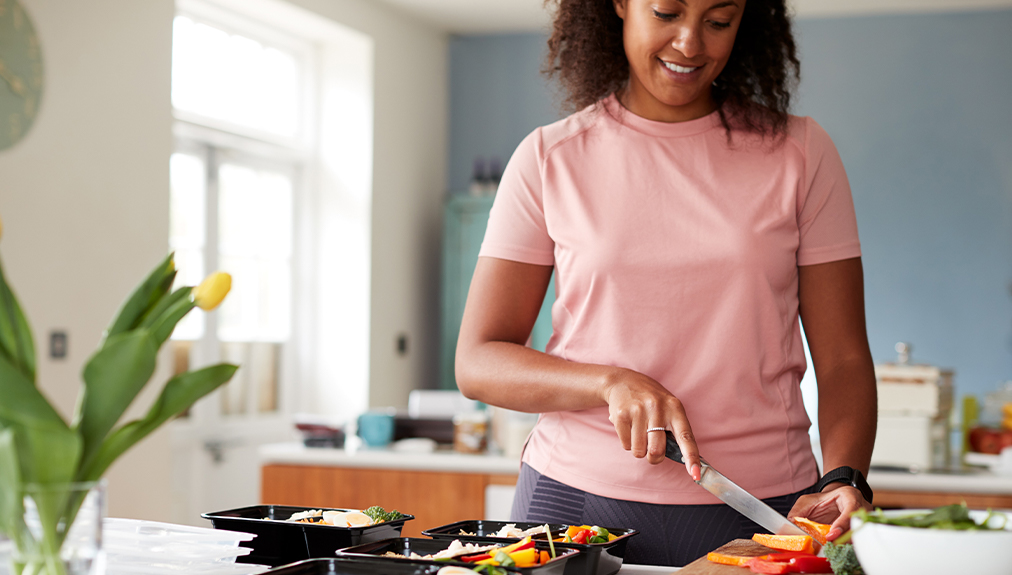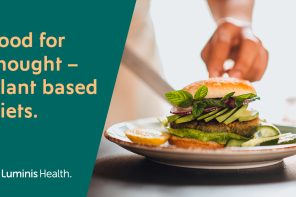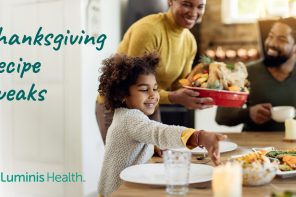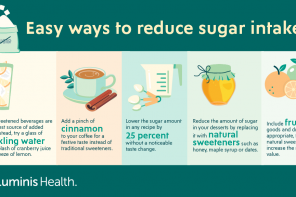With the social distancing brought on by the coronavirus (COVID-19) pandemic, we are all spending more time in our homes than usual. This is the perfect time to remind ourselves that intuitive eating is an important part of a healthy lifestyle.
Intuitive eating is about becoming attuned to our body’s natural hunger and fullness signals or cues. We are born with this inner wisdom but it can be difficult to connect with after years of fad dieting and food myths.
We often encourage individuals to slow down and use the acronym HALT (Hungry, Anger, Lonely, Tired) before choosing something to eat.
If you are truly physiologically hungry (H) and haven’t eaten in two to four hours, then the answer is you need food. The goal is that when we are hungry, 90 percent of the time we select nutrient-dense foods that have a positive impact on health. These are foods rich in lean protein, complex carbohydrates, healthy fats and fiber. Nutrient-dense foods also provide us with needed vitamins, minerals and phytonutrients. Then, 10 percent of the time we are including fun foods. These are foods that might be less nutrient dense but are important to our families and us.
Food is fuel for our bodies, but it is also a source of pleasure, family traditions and cultural importance. We need to stop labeling food as “good” or “bad” and remind ourselves that all foods fit in a healthy diet. It is about awareness and moderation.
We all know that sometimes we eat for reasons other than hunger. When you are angry (A), upset, feeling stressed or sad, you might turn to food as a way to make yourself feel better. By identifying how you are feeling and how emotions can impact your desire to eat, you can look for behaviors other than eating that might help you. For example, taking a walk, meditating, reading a book or making a list of activities you enjoy so you have ideas ready when needed. Learning ways to manage your emotions aside from eating will help build a life of resilience and joy.
It might be that during this time of social isolation you feel lonely (L). Choosing to eat to assuage loneliness might make you feel better in the short run, but can negatively impact your health when you find yourself at home for many days on end. If feeling lonely drives your desire to eat, make an effort to call a friend, FaceTime with family, write a letter or look for other ways to stay connected. Meeting with a therapist or mental health professional to discuss your feelings might also be helpful.
Behaviorists say that humans are the only animals on the planet that don’t know the difference between feeling tired (T) and being hungry. We may think we need a snack at 9 or 10 pm when what we really need is sleep. Looking for ways to rejuvenate yourself without food is important. Drink eight to 10 ounces of water and take a walk. Listen to a calming meditation or take an afternoon nap and be sure you are getting adequate sleep at night.
During this stressful time of social distancing try to be mindful about your relationship with food. Remember, food is the fuel our bodies need to run efficiently but at the same time, what we like to eat makes us feel good.
So, bake those chocolate chip cookies with your children or have a small bowl of ice cream. But, slow down, enjoy every bite and don’t feel guilty. Keep the big picture in mind and remember that when we fuel our bodies with nutrient-rich foods, we feel good and are better able to handle life’s ups and downs.
Ann Caldwell and Maureen Shackelford are nutritionists and registered dietitians at Anne Arundel Medical Center. To reach them, call 443-481-5555.




